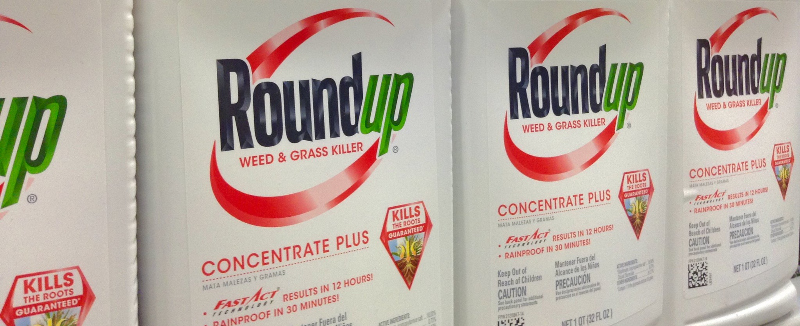
The Dog Days of Summer can be a real challenge to an elected official’s “comms team”– that’s what a press office is called these days. Things can get pretty quiet in late August around City Hall. But Mayor Jenny Durkan’s communicators did their best to beat the languor last Friday with a dubious Durkan Digest post.
It announced a fresh executive order for reducing the city’s herbicide use, especially the hugely controversial glysophate, for weed control in city parks, golf courses, and other public spaces. It also trumpeted the Mayor’s forming a big new interdepartmental committee to galvanize action, an all too familiar management approach for city government.
Trumpet fanfares are not exactly called for, however.
Glysophate is the active ingredient in Monsanto Chemical’s Roundup products. Lawsuits brought by sufferers of Non-Hodgkin lymphoma claim Roundup as the cause. Three huge jury verdicts against Monsanto and Roundup have triggered cable news network saturation advertising by plaintiffs’ personal injury lawyers–“Have you been exposed to Roundup?…” All those commercial breaks during the news shows might have drawn the Durkan comms team’s eye to a seemingly easy mark.
“We will continue to lead the nation in reducing the use of toxic chemicals,” said Mayor Durkan in her blog. That sentence one hopes was crafted by the comms team and not actually uttered by the Mayor herself.
The comms team had not hired on for an as-yet-un-elected Mayor Durkan two years ago in July, 2017 when a front-page Seattle Times expose by an industrious summer intern reporter savaged the city for lagging in pesticide use reduction commitments and for still applying herbicides in allegedly pesticide free parks:
“A Parks and Recreation official acknowledged that the agency’s pesticide-reduction efforts have not been up to its standards. ‘It’s true, we need to get our act back together with this stuff,’ said Barbara DeCaro, a senior environmental analyst in the department and the coordinator of Seattle’s integrated pest-management team.”
In 2019, artful language is the trademark of a careful comms team. No hard-edged words like “ban,” but rather “directed to avoid.” Mayor Durkan’s new executive order, goes just so far as to instruct city departments to use glysophate only when necessary “to achieve optimal results.” That sounds as if the committee, not just the comms team, may already be doing the slithery word-smithing.
Meanwhile, thousands of Roundup lawsuits are piling up in courts everywhere. One federal district court judge did Roundup no favors even while knocking back to only $25 million a much larger jury award in California for punitive damages. He went on to write that Monsanto’s conduct was “reprehensible.” Names change but the game remains the same. Big pharma Bayer bought Monsanto in mid-2018 for $63 billion. Bayer has since been hammered by a 35% drop in its share price as the litigation tidal wave against its newly-acquired Roundup product lines has begun to break ashore in intervening months.
Citizens and environmental organizations worldwide are fighting for glysophate bans. Perhaps needless to say, the Trump Administration’s Environmental Protection Administration continues to call glysophate safe. That contradicts World Health Organization scientists’ judgment that it is probably carcinogenic to humans. A draft toxicological profile for glysophate released by the Centers for Disease Control in April has reinforced broad glysophate concerns beyond cancer risk. Herbicide formulations (like Roundup) containing glysophate are probably worse than glysophate alone.
Unlike Seattle, cities elsewhere are outright banning park and public open space use of glysophate: A host of cities in California including Los Angeles and Oakland, as well as Miami, Florida. Indeed, the new leadership is coming from Vancouver and North Vancouver, B.C., where any application of glysophate by anyone is banned except under the most limited circumstances. Portland, not Oregon, but Maine, the same. Only to be blasted by U.S. Secretary of Agriculture Sonny Perdue, Vietnam, a country with some difficult history with herbicides, banned all imports of glysophate in April. Malawi, in the service of whose Department of Agriculture this writer first gained chastening experience with chemical pest management 50 years ago, quickly followed suit. The European Parliament has voted overwhelmingly for a five-year phase out of glysophate use, a direction not yet totally resolved. The Netherlands banned glysophate five years ago.
Seattle has a long way to go to claim national leadership in the fight against toxic herbicide addictions fueled by big chemical manufacturers. Dramatically reduced toxic pollution of our land as well as our run-off afflicted Puget Sound and all its waterways and marine life has to be our resolve. Our effective weapon is not a press release about city golf courses. We need to put the bulls-eye on our own use and the sales at the Home Depot and their not-so-benign ilk in the lawn and garden business who are in league with the chemical companies. We need the Mayor’s support to do it. That’s how to stand up for a safer community and a more sustainable world.
Discover more from Post Alley
Subscribe to get the latest posts sent to your email.

Thx for this. I’ve been fighting roundup since the 70’s. Always wondered about my cancer and the shed full of it I discovered when I bought my house. That was staging in 2000, dump roundup on a yard when putting it up for sale. I had to hire a landscaper to remove all the soil and rebuild my yard to get rid of the poison. I still see my neighbors using it on tiny weeds one would could pull by hand.
The important issue of herbicides aside, what bothers me in this story is the tendency of Mayor Durkan to play things “cute” in this way. You would think that she would swear off this kind of lawyerly evasion after she trapped herself on the head tax, which she opposed and should have simply declared that rather than engineering a compromise with business that blew up. You can’t long be too clever when your job is in such a public fishbowl.